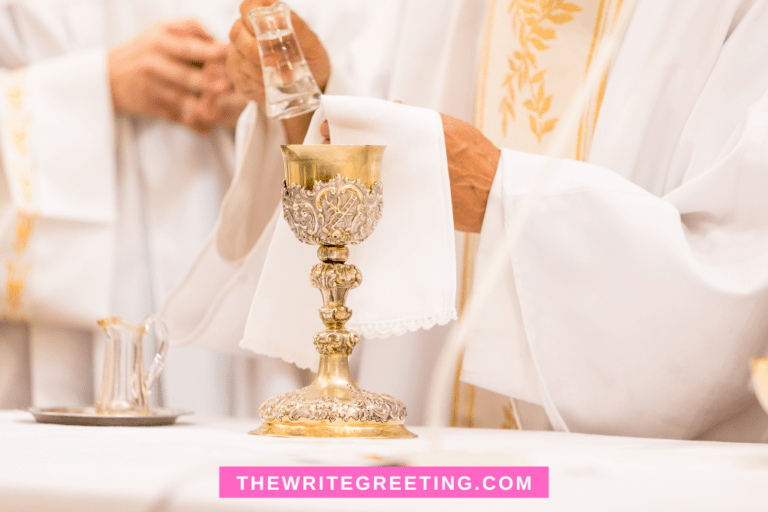Thank You Note For A Priest: Expressing Gratitude With Grace
Writing a thank you note to a priest is a meaningful way to express your appreciation for their guidance, support, and spiritual leadership. Whether it's for a special occasion, a personal crisis, or simply for their ongoing presence in your life, a heartfelt note can make a significant impact. In this article, we will explore the importance of expressing gratitude to clergy members and provide you with useful tips on how to craft the perfect thank you note.
Priests play an essential role in the spiritual lives of their congregations, offering counsel, leading services, and providing comfort during difficult times. A thank you note can serve as a reminder of the positive influence they have on their community. In the following sections, we will delve into various aspects of writing a thank you note to a priest, including the key elements to include, examples of notes, and the significance of gratitude in our spiritual lives.
By the end of this article, you'll be equipped with the knowledge and inspiration needed to express your appreciation in a thoughtful and respectful manner. Let's explore how to articulate your feelings of gratitude and make your thank you note truly special.
Table of Contents
The Importance of Thanking Your Priest
Thanking your priest is not just a polite gesture; it is an essential part of building a strong relationship with your spiritual leader. Here are some reasons why expressing gratitude is important:
- Encouragement: A thank you note can encourage your priest to continue their good work and remind them of the positive impact they have on their community.
- Strengthening Bonds: Gratitude helps to foster a deeper connection between you and your priest, reinforcing your shared values and beliefs.
- Spiritual Growth: Expressing thanks can contribute to your own spiritual growth, as it encourages humility and recognition of the support you receive.
Key Elements of a Thank You Note
When writing a thank you note to a priest, certain elements should be included to make it heartfelt and meaningful:
1. Personal Salutation
Begin your note with a personal greeting. Use their title and last name (e.g., "Dear Father Smith") to show respect.
2. Express Your Gratitude
Clearly state your appreciation. Be specific about what you are thankful for, whether it was their advice during a tough time or their support in a recent church event.
3. Share a Personal Touch
Including a personal anecdote or experience can make your note more meaningful. Share how their actions have positively impacted your life.
4. Closing Statement
Finish your note with a warm closing. You can use phrases like "With gratitude" or "In faith" followed by your name.
Examples of Thank You Notes
Here are a few examples to inspire your own thank you note:
Example 1: General Appreciation
Dear Father Smith,
Thank you for your unwavering support and guidance during my recent struggles. Your words of encouragement have helped me find peace and strength. I truly appreciate all that you do for our community.
With gratitude,
John Doe
Example 2: After a Special Event
Dear Father Johnson,
I wanted to take a moment to express my heartfelt thanks for your beautiful sermon during our wedding ceremony. Your words made our day even more special, and we are grateful for your presence in our lives.
In faith,
Sarah and Tom
Adding a Personal Touch
To make your thank you note stand out, consider adding a personal touch:
- Handwritten Notes: A handwritten note adds a personal touch and shows that you took the time to express your feelings.
- Include a Small Gift: A small token of appreciation, such as a religious book or a donation to the church, can complement your note.
- Share a Memory: Mention a specific moment or memory that highlights the priest's impact on your life.
The Spiritual Significance of Gratitude
Gratitude is a fundamental aspect of many religious practices. Here's why it matters:
- Connection to Faith: Expressing gratitude strengthens one's connection to their faith and the community.
- Promotes Positivity: Gratitude fosters a positive mindset, allowing individuals to focus on the blessings in their lives.
- Encourages Generosity: When we acknowledge the good in our lives, we are more likely to pass that kindness onto others.
When to Write a Thank You Note
While it’s always a good idea to express gratitude, there are specific occasions when a thank you note is particularly meaningful:
- After receiving personal advice or counseling.
- Following a significant life event, such as a wedding, baptism, or funeral.
- After participating in a church event or community service.
- During the holiday season or any time you feel inspired to express your appreciation.
How to Send Your Thank You Note
Once you've crafted your thank you note, consider the best way to send it:
- In-Person: If you see your priest regularly, handing them the note in person can be a warm gesture.
- Mail: A traditional approach is to mail your note to the church office. Make sure to address it properly.
- Email: If time is of the essence, a thoughtfully written email can also convey your gratitude.
Final Thoughts on Gratitude
Expressing gratitude towards your priest is a beautiful way to acknowledge their influence in your life. A well-written thank you note can strengthen your relationship and foster a spirit of community and faith. Remember, taking the time to express your appreciation not only benefits your priest but also enriches your own spiritual journey.
We encourage you to share your thoughts in the comments below or share this article with others who may benefit from it. Your words of thanks can inspire a ripple effect of gratitude within your community.
Thank you for taking the time to read this article, and we hope to see you back here again soon!
Fey Names In Dungeons And Dragons: A Comprehensive Guide
Nieces And Nephews Quotes: Celebrating The Joy Of Family
Happy Heavenly Mother's Day Grandma: Honoring Our Beloved Matriarchs



ncG1vNJzZmivp6x7s7vCpJmroZScsqO%2B1KKlrGafp7Rww86ro52mlazAcMDHmqWkZamkwm66zq2cZqiinrK0wI2hq6ak
